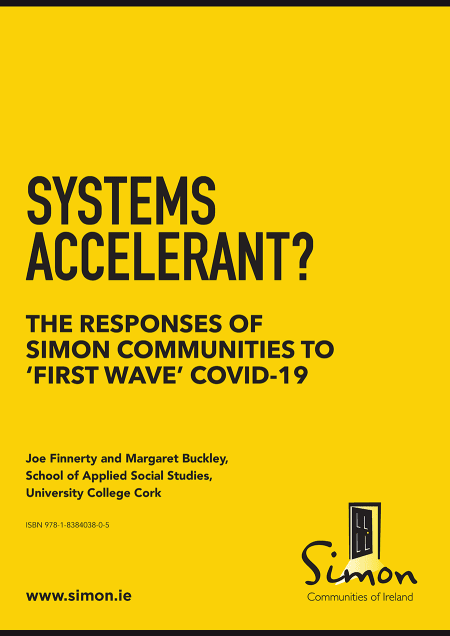
The responses of Simon Communities to 'first wave' Covid-19
This research evaluates the responses of the eight Simon Communities in the Irish Republic to the challenges posed by Covid-19 from the point of view of the Simon Communities and of key statutory (Local Authority and Health Service Executive) respondents, across the eight regions in which Simon operates, during the ‘first wave’ or early phase of the pandemic in the period March – August 2020.
While responses to the challenges posed by Covid-19 varied across the eight Simon Communities with their different mix and scale of services, the focus of the research is to arrive at an overall evaluation of these responses, rather than providing a detailed evaluation for each region. Although reflecting the Simon Communities context, the findings are likely to be indicative of the experiences of other homelessness NGOs oriented towards single homeless persons during this period.
 On the basis of the interviews conducted, the eight Simon Communities have responded well overall to the challenges posed by first-wave Covid-19 across a range of services. Steps were successfully taken to decrease the number of people in any given emergency hostel, move residents to other services and facilities and ensure that cocooning / isolation sites were established, engage with rough sleepers, and to develop innovative responses to the needs of methadone users.
On the basis of the interviews conducted, the eight Simon Communities have responded well overall to the challenges posed by first-wave Covid-19 across a range of services. Steps were successfully taken to decrease the number of people in any given emergency hostel, move residents to other services and facilities and ensure that cocooning / isolation sites were established, engage with rough sleepers, and to develop innovative responses to the needs of methadone users.
A more mixed picture emerges in relation to adjustments to food and health services and long-term supported accommodation, and in relation to staffing, in the face of the multiple challenges presented by the pandemic. The successful responses in relation to emergency accommodation and self-isolation, engaging with rough sleepers, and innovative responses to drug use, have emerged through enhanced co-operation with local authorities and the Health Service Executive.
Overall, the very low levels of infection and fatality amongst rough sleepers and users of emergency shelters during the first wave of the pandemic was due in no small part to their early recognition as a high-risk group for Covid-19, and the expansion and acceleration of services put in place by homelessness NGOs working together with statutory bodies.
Responses to the pandemic by the Simon Communities – working in co-operation with Local Authorities and the regional Health Service Executive, may provisionally be characterized as a ‘systems accelerant’. The term ‘system accelerant’ draws attention to the strengthened implementation of principles already espoused at policy level (the elimination of involuntary rough sleeping and long-term use of emergency accommodation and moves towards the provision of independent accommodation with appropriate supports).
However, ongoing research is required to monitor whether the gains achieved by Simon services during Covid-19 will be maintained post-pandemic. This crucially depends on the continued and increased supply of suitable accommodation for single persons exiting homelessness, with appropriate health and other supports as required.
This is the first in a series of three reports.
The second report explores the experiences and perspectives of Simon Communities service users themselves as they navigated successive waves of the pandemic. The Experiences of Simon Community service users during the Covid-19 pandemic’ (Finnerty, Cullinane and Buckley, 2021).
The third report offers a more comprehensive evaluation, again based on interviews with Simon and statutory managers, of the responses of the Simon Communities during the four waves of the pandemic in the period March 2020 – August 2021. Sustaining the accelerant? The responses of Simon Communities to four waves of Covid-19 (Finnerty, Cullinane and Buckley, 2021).
Joe Finnerty and Margaret Buckley at the School of Applied Social Studies at University College Cork conducted this first phase of the research series.